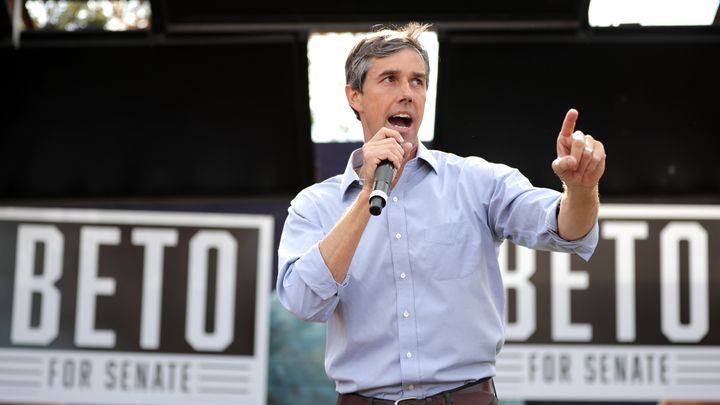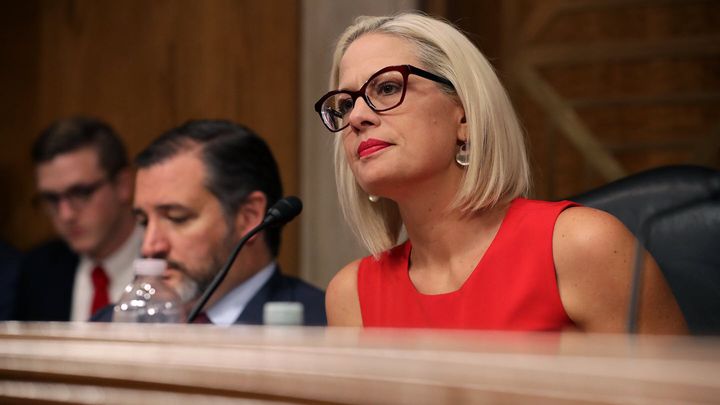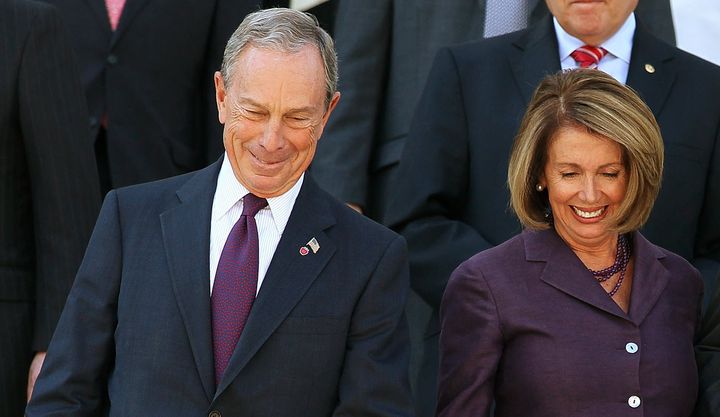UPDATE, Dec. 12, 5:20 p.m.: I have confirmed that according to the latest campaign finance report, which covers the period from Oct. 17 through Nov. 26, the O’Rourke campaign had not returned 29 “large donations” of over $200 from oil and gas executives, violating the No Fossil Fuel Money pledge O’Rourke signed.
It all started with one Sunday morning tweet from investigative reporter David Sirota.
On Dec. 2, Sirota was browsing through OpenSecrets.org, the most popular website for campaign finance data. On its “Oil & Gas” page, Sirota found something that surprised him: Out of all federal candidates in the 2018 election cycle, Democratic Texas representative and 2018 Senate candidate Beto O’Rourke had the second-highest total of donations linked to the oil and gas industry. (Disclosure: David Sirota was my senior colleague when we worked together at International Business Times in 2017-18, and he has collaborated with Sludge this year.)
The tweet set off an online firestorm that lasted all week. I’m a money-in-politics reporter, and I got involved in some rather regrettable Twitter battles involving the tweet. But I also took it upon myself to dig a bit deeper than the others duking it out online.
Based on detailed campaign finance data provided to me by the Center for Responsive Politics, the organization that operates the OpenSecrets website, I’ve found that of the $430,000 that O’Rourke’s Senate campaign received from individuals who work in the oil and gas industry, 75 percent has come in the form of “large” donations over $200. The donors include more than two dozen oil and gas executives. More than 30 donations were the maximum allowed amount of $2,700. But the Texas representative also took in tons of small donations of $200 and under.
I also found that O’Rourke broke the No Fossil Fuel Money Pledge—a commitment to reject campaign donations over $200 from fossil fuel PACs and executives that was endorsed by 16 environmental groups—which he signed.
This piece is an accounting and contextualization of the numbers behind O’Rourke’s fossil fuel industry donors. It’s also a personal effort to explain why I and others in the campaign finance world think they’re worth looking at.
A ‘Dangerous Attack?’
“I do a lot of campaign finance reporting and was working on a project about the influence of the oil and gas industry, which is a storyline I’ve covered for a while,” Sirota told me. “While I was reviewing some of the data, I saw the congressional rankings at the Center for Responsive Politics and hadn’t realized O’Rourke had gotten a decent amount of support from donors in the oil and gas industry. In the era of climate change and when we know aggregate individual donations from major industries can be influential, I thought that was mildly noteworthy, so I tweeted it. I didn’t write some giant story on it, and I didn’t even make a value judgment about the donations in the tweet—I just tweeted a link to the CRP page. That’s all.”
[Beto O’Rourke Removed From ‘No Fossil Fuel Money Pledge’ Following Sludge Report]
Let’s review who was prominently in the news at that time. In an impressive showing, O’Rourke had lost a close race against Texas Republican Sen. Ted Cruz. As soon as the election concluded in early November, people began talking about O’Rourke as a possible Obama-esque 2020 presidential candidate. He’s on the young side. He’s got charisma. He has a huge network of fans and small donors. His campaign strategy was terrific.
When someone ascends the political hype ladder, I often do a bit more reading and a bit more research about that person. So do a lot of other reporters. It’s how media tends to work.
Since Dec. 2, we’ve found out that O’Rourke met with Barack Obama in mid-November, and an establishment Democratic bundler and retired investment banker, Louis Susman, is encouraging him to run for president. “Betomania” has only just begun.
On Monday evening, Center for American Progress President Neera Tanden quoted Sirota’s tweet, characterizing it as “dangerous,” an “attack” on O’Rourke, and “doing Trump’s bidding.”
I’ll be honest—I was pretty shocked. Tanden, a close Clinton ally and Bernie Sanders foe, has had a contentious relationship with the left, with which Sirota is often associated. But her claim that a reporter’s tweet of campaign finance statistics about a potential 2020 candidate was a dangerous attack that Trump would have ordered? Who was really being attacked here?
(It’s worth noting that the Center for American Progress has in the past accepted donations from multiple fossil fuel companies and, as of 2017, was still receiving money from Pacific Gas and Electric Company. During the 2016 Democratic Platform Committee’s drafting process, Tanden voted against a fracking ban, a carbon tax, and a measure to keep fossil fuels in the ground.)
A domino effect began, with the likes of Bloomberg columnist Joe Nocera tweeting, “Of course it’s an attack,” and another Bloomberg opinion writer, Noah Smith, writing in a now-deleted tweet, “Yes, BernieBros, attacking Beto will be great for this country.” Musician and Twitter personality Mikel Jollett called Sirota’s tweet “dishonest and “misleading.” The list goes on.
None of Sirota’s critics mentioned the fact that the link he provided in his tweet includes a methodology section just below the list of the top 20 recipients of oil and gas cash: “The numbers on this page are based on contributions from PACs and individuals giving $200 or more.” If you click on “O’Rourke, Beto” you’ll find a table that breaks down his oil and gas-linked contributions: $429,752 from individuals who work in the industry and $0 from PACs. O’Rourke decided to reject all corporate PAC money in his Senate race.
After a few days of insults hurled left and right, I decided to go straight to the source of the data analysis and the terminology. I asked the Center for Responsive Politics (CRP) about its methodology and its choice of words. Research Director Sarah Bryner told me that Sirota’s terminology, “oil and gas campaign cash,” is the way her organization phrases it as well.
Was Sirota’s tweet misleading in any way, I asked? “I don’t think so, no,” Bryner replied. “We say the same thing all the time!”
“I think campaign contributions are public information at the levels that we’re talking about, and so talking about them is fair game,” said David Turnbull, strategic communications director at Oil Change USA, a nonprofit sister organization of Oil Change International, which helped organize the No Fossil Fuel Money Pledge.
In her initial tweet and her reply to it, Tanden didn’t specify what about Sirota’s tweet constituted an attack. She later stated that because Sirota didn’t specify that the money came from individuals who work in the oil and gas industry, not oil and gas corporations’ political action committees, it was an intentional effort to smear the Texas congressman. Many, many others—both blue-checkmarked and not—repeated her assertion, which I will address later in this piece.
I firmly believe that Sirota’s tweet was neither misleading nor an attack on anyone, but Democrats have used money from fossil fuel executives to attack their opponents. In fact, the Hillary Clinton campaign did so in 2008 against Barack Obama during a close presidential primary election.
While this was clearly a critical ad, Sirota’s tweet was an objective campaign finance observation. I’d say the response to it, however, wasn’t exactly an endorsement of campaign finance reporting or an honest 2020 primary.
Prominent Democrats have urged the party to reject oil and gas executives’ contributions. Christine Pelosi, an influential party strategist and daughter of House Minority Leader Nancy Pelosi, proposed a ban on fossil fuel PAC donations to the Democratic National Committee, which Democrats endorsed but then reversed two months later. Another provision she pushed for was a rejection of large donations (over $200) from fossil fuel executives, which didn’t pass.
Contextualizing the Cash
While Sirota’s tweet was neither misleading nor an attack, Bryner said, those who do use these kinds of statistics as attacks “have to to be smart about this” and “have to understand context.”
Bryner is from Alaska, and most people she knew there were tied to the oil industry in some way. “I think that the kind of demonization of industries and employers and all of that sort of stuff is a problematic simplification of the relationship between industry interests and politicians,” she said.
One point made by some of Sirota’s detractors, that the money from oil and gas employees constituted a tiny part of his monstrous fundraising haul, is correct. O’Rourke had a remarkable fundraising effort, having raised $69.2 million as of Oct. 17, much of it from small donations, for his strong challenge to Texas Republican Sen. Ted Cruz. The challenger did extremely well, considering he is a Democrat who faced an incumbent Republican in a deep-red state. Through Oct. 17, O’Rourke pulled in about $430,000 from individuals who work in the oil and gas industry. (The most recent campaign finance report, the “post-general” filing, has not yet been itemized by the Federal Election Commission, nor by CRP, so I’m not including this final contribution data in my analysis. A cursory review of these donations, which came in the final few weeks of the election, does show that O’Rourke received at least one more maximum contribution from an oil and gas executive.)

Let’s be real: $430,000 is a lot of money. But in context, it’s a small fraction of O’Rourke giant fundraising total, and none of the money came from corporate political action committees.
I’d actually seen the oil and gas stat a few days before Sirota’s tweet, and I was initially surprised that a rising Democratic star, whom many call a progressive, would get so much from individuals in the oil and gas industry. But it’s not shocking that O’Rourke would get some money from these folks, even despite his opponent Cruz’s unflinching allegiance to the fossil fuel industry. (Cruz’s numbers are higher than O’Rourke’s; he received $505,000 from oil and gas interests over the last two years, accounting for nearly 1.75 percent of his Oct. 17 fundraising total.)
Texas is the largest oil and gas-producing state in the nation. The industry employed roughly 325,000 Texans in 2017. And while O’Rourke has a 95 percent lifetime score from the League of Conservation Voters, his record on fossil fuels is mixed. In 2015, he joined most House Republicans and 25 Democrats by voting against the oil export ban. The following year, he voted against an amendment that would have prohibited funding for offshore drilling research in the Gulf of Mexico.
“No one likes it when the progressive candidate-of-the-moment gets money from the industry that everyone loves to hate,” said Bryner. “I would be surprised if he didn’t get a lot of money from oil and gas. You need to be very careful to recognize context when you’re looking at this data.”
Nonetheless, O’Rourke doesn’t appear to have progressive views on oil and gas. He praised natural gas in October, calling its production “a great job opportunity and an environmentally responsible opportunity.” In a debate with Cruz, he said that choosing between oil and renewable energy would be a “false choice.”
The reality is that O’Rourke is a moderate Democrat. That’s not my hot take; it’s how he’s chosen to self-identify. O’Rourke isn’t among the dozens of reps in the Congressional Progressive Caucus, but he is a member of the New Democrat Coalition, of which Bill Clinton was a key member, which “is committed to pro-economic growth, pro-innovation, and fiscally responsible policies” and seeks bipartisan solutions to America’s problems.
O’Rourke’s oil and gas-linked donations are worth looking into, I’d wager, because by examining the data we find the real facts and discover the full context. In fact, for campaign finance reporters such as Sirota and myself, to ignore it would be an oversight. I’ll explain why later in this article.
When writing about one potential candidate’s money from a particular industry in an article (as opposed to one tweet), it’s a good idea to check out the relationships that other potential candidates for that office may have. For a few of the prominent Democrats currently in office who appear to be considering a White House run, here are the numbers based on the most recently available itemized data.
None of these politicians received a large percentage of oil and gas donations in their most recent elections, except perhaps Gov. John Hickenlooper of Colorado. California Rep. Eric Swalwell had a slightly higher percentage of donations from oil and gas-linked donations than did O’Rourke, who is third on the list.
Note that these comparisons are tricky because of the many variables of each election. A candidate in a safe seat doesn’t have to raise as much money as a candidate in a tight race. A Senate race typically attracts more money than a House race. The committees a candidate sits on have a big effect on who gives them money. For Hickenlooper, West Virginia House candidate Richard Ojeda, and for Bernie Sanders’ presidential campaign, I used data from FollowTheMoney.org, because CRP did not have precise oil and gas breakdowns.
Off the Deep End
By Thursday, after Washington Post columnist Elizabeth Bruening published an op-ed on Wednesday critical of O’Rourke, the narrative had turned into a full-blown conspiracy theory.
Tanden tweeted, “Bruenig’s piece in the Post on Beto is just the latest attack by a supporter of Senator Sanders on Beto: joining Jilani, Jacobin and Sirota. Feels a bit orchestrated and clearly they are worried.” She referred also to stories critical of O’Rourke written by Zaid Jilani in Current Affairs (Dec. 4) and by Branko Marcetic in socialist magazine Jacobin.
In the 1990s, Sirota worked as then-Rep. Sanders’ press secretary, but how many people do you know are still secretly doing the job they left 20 years ago?
Others such as Tanden’s colleague Topher Spiro and Dante Atkins, communications director for Rep. John Garamendi (D-Calif.), who was deputy secretary of the Interior under President Bill Clinton, also joined the conspiracy chorus. (Spiro has since deleted his conspiracy tweet after I and others publicly criticized him for it.) Tanden and Spiro were both sure to claim they haven’t decided on a 2020 favorite.
More accounts with large followings offered additional false takes. Writer Marcus H. Johnson was convinced it was a coordinated plot by “Bernie’s people.” Clinton diehard Tom Watson said it was “so transparent” that “Sanders Central” was attacking O’Rourke.
Perhaps most surprising to me, Esquire writer Charles Pierce got in on the action, too, posting a blog with wild, evidence-free claims including, “There appears to be a concerted effort from the Bernie Sanders camp to paint O’Rourke as a tool of the oil and gas industry” and, “There is an obvious effort by those folks to clear the progressive side of the field as cleanly as Hillary Rodham Clinton attempted to clear the field in 2016.”
This whole roughly five-day episode was quite a ride, but let’s get back to the real point of this article, and what we dedicate our careers to here at Sludge: examining money in politics.
Individual Contributions vs. Corporate PACs
While corporate PACs and donations from individuals who work at corporations are certainly distinct, there’s a lot more overlap than most people realize. Corporations are free to set up their own political action committees, which are subject to limits on incoming donations and outgoing contributions to candidates.
So who funds corporate these PACs? The money is not from corporate treasuries—it’s donated by the people, generally executives and other highly-paid staff, who work at those corporations.
“People would have no problem calling PAC money to candidates from a specific industry ‘industry money,’ but PAC money comes from people,” said Bryner. “People control the PAC and they donate directly to it, and so what difference, in some ways, does it make whether it comes from CEO versus the PAC? I think that people want to make these sorts of discussions about purity, differentiations, when that’s not the world we live in.”
If Beto’s contributions are indeed counter to the spirit of the No Fossil Fuel Money Pledge, we’ll take him off the website and certainly encourage him to come back into compliance with the pledge.”
David Turnbull, Oil Change USA
Dozens of Democrats, including many who won, rejected corporate PAC money in the 2018 election. It’s become a popular stance as Trump’s Washington has become engulfed in the most corrupt presidential administration in history. But not all no-corporate-PAC-money candidates are the same.
As Sludge co-founder Donny Shaw found last week, 20 first-time representatives-elect who refused corporate PAC money did accept donations from the corporate-funded PAC of the New Democrat Coalition, a group of moderate, pro-business Dems. Twenty-five Democratic House newbies recently became New Democrats.
In April, Jilani wrote in The Intercept that despite big-name senators pledging to reject corporate PAC money, money still flowed into their campaigns via business executives’ personal contributions. And popular left-of-center political figures who do accept corporate PAC money still tend to attract far more from individual contributors. However, many candidates who have rejected corporate PAC donations truly believe that wealthy special interests have corrupted our democracy, and their pledges are strong statements against the outsize influence that corporations hold over lawmakers and policy outcomes.
Let’s Do the Numbers
“These are small dollar donations from employees,” tweeted Tanden on Monday.
CRP quickly responded to my request for the full oil and gas industry contribution data for O’Rourke. After a fairly lengthy process of cleaning it up by differentiating donors with same name, analyzing the nature of various donors’ positions at oil and gas companies, and more, here’s what I found out based on data through Oct. 17.
O’Rourke received a total of $429,759 from 2,724 donors who work in the oil and gas industry. This total was 0.62 percent percent of his $69.2 million fundraising haul as of Oct. 17. The average donation was $158, and the median donation was $50.
Donation Analysis
- O’Rourke received $324,650 from 524 “large” donations of over $200, amounting to 75.5 percent of the total.
- He got $105,109 from 2,200 “small” donations of $200 and under, amounting to 24.5 percent of the total.
- 92 donations were $1,000 or more, adding up to $173,039, or 40.3 percent of the total.
- 33 were maximum donations of $2,700, adding up to $96,400, or 22.4 percent of the total.
Donor Analysis
- 1,024 individuals in the oil and gas industry donated to O’Rourke.
- The average of total donations from individuals was $420, and the median total was $163. (Many contributors donated multiple times.)
- Donors included 24 executives, who gave a combined total of $35,125.
- $395,866, or 92.1 percent, came from donors living in Texas.
“As has always been the case and continues to be so, generally, people who give above $200 are not the rank and file office staff; they are the higher level vice presidents and CEOs of the corporations,” said Bryner. “I actually have looked at the data on O’Rourke and it’s the same idea; these tend to be higher-level people.”
Here are the 20 most common occupations listed by donors in the oil and gas industry. Note: There’s a good chance that many of the “not employed” donors are actually employed, but they failed to include that information when making donations.
Beto’s Broken Pledge
Some anti-corporate-money candidates took things much further when it came to fossil fuels. 1,324 local, state and federal candidates, including O’Rourke, signed the No Fossil Fuel Money Pledge, which was organized by a coalition of progressive and environmental groups including leading member Oil Change International. The pledge is a commitment to “not knowingly accept any contributions over $200 from the PACs, executives, or front groups of fossil fuel companies.”
CRP’s data factors in refunded contributions through Oct. 17. The O’Rourke campaign reported refunding about $209,000 worth of donations from that date through Nov. 26, according to its latest filing. After the Federal Election Commission itemized the refund data, I went through it to see if the campaign had refunded any of the oil and gas executives’ donations I had identified in CRP’s data (after this article was first published). The campaign had not refunded any of them, making it clear that O’Rourke violated his No Fossil Fuel Pledge dozens of times. I’ve made the executive contribution data available on a public spreadsheet. Here are the stats:
- 24 oil and gas executives made 64 donations to O’Rourke through Oct. 17.
- 29 of these donations were “large” donations of over $200.
- Five of these donations were the maximum of $2,700.
- 22 of the donors gave more than $200 in aggregate, and 14 gave $1,000 or more.
O’Rourke’s office and campaign did not respond to repeated requests for comment.
“We only just found out about the information based off of your email and retracing that thread,” said Oil Change USA’s Turnbull. “We’re going to be reaching out to Beto’s campaign to get a better understanding of what the situation is, and if his contributions are indeed counter to the spirit of the pledge, we’ll take him off the website and certainly encourage him to come back into compliance with the pledge.”
In Conclusion
In the Beto Battle on Twitter, many users, including Tanden, failed to distinguish between journalism and electoral advocacy. Regardless of your personal opinions of Sirota, and regardless of where he may have worked in the distant past, he doesn’t work for any political campaigns. He is an investigative reporter who works for a small, independent publication, as do I. He, and I, write about issues we think are most important, such as climate change and the reasons behind the United States’ inaction on it.
The idea that tweeting out interesting campaign finance findings, or in the case of Liz Bruenig, offering her leftist opinions on what she sees as shortcoming on O’Rourke’s part, is bad for democracy is wrong. Now is the beginning of a primary election, a time when people take a harder look at the candidates. It’s when people begin the process of deciding for whom they’ll cast their votes in the 2020 primaries.
For politics reporters like myself, it’s when we refocus our energy from one election to the next. If I decided, as many tweeters have generously told me, to just “let things play out” or to “fuck off and die and take the Sirota [BLEEP] klan with me,” I don’t think either outcome would be a very good one.
It’s not our job to sit back and let the political operatives decide who deserves scrutiny and who doesn’t. We’ve seen that movie before. What we’ll continue doing at Sludge is dissecting everyone’s campaign finance reports and overturning anything we think is worth your eyeballs, regardless of party, charisma, and, most importantly, what pundits and ideological think tanks want. Join our newsletter to make sure you get our latest.
If you’ve read this far, I thank you sincerely. See you in the Twitterverse.
This article has been updated to exclude oil and gas-linked contribution data from Cruz’s 2016 presidential campaign.



